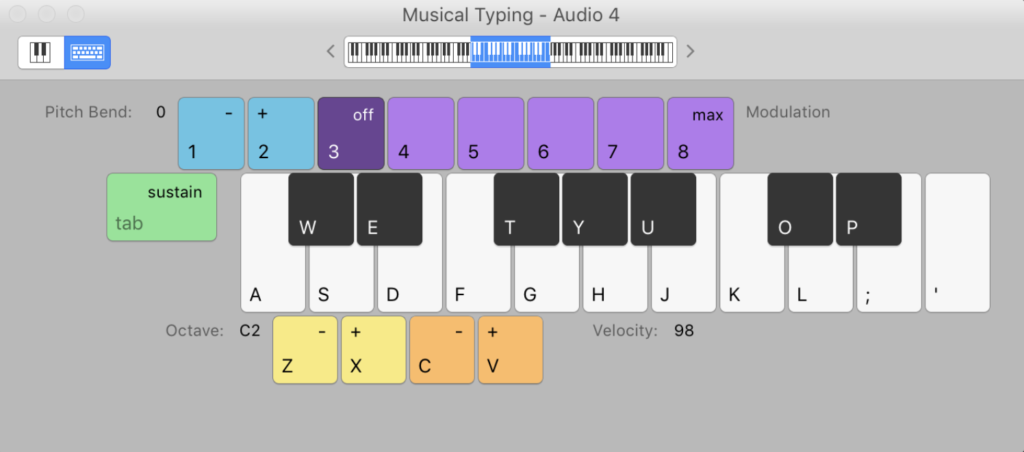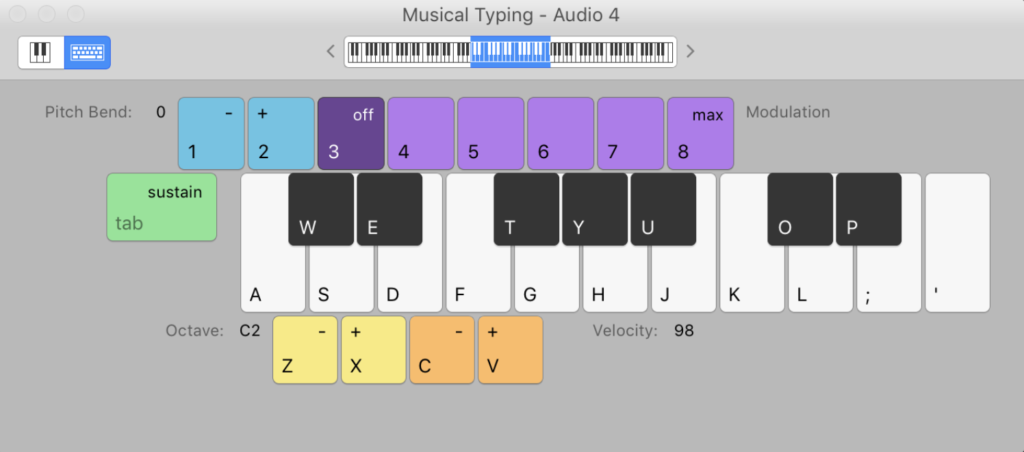It wasn’t until I got a MacBook that I was able to find an easy way to experiment with recording through Garageband. Wanting to try making some Hip Hop beats for fun with some friends, I found a MIDI keyboard at my local music store and instantly became hooked in producing music, and I haven’t looked back since.
What is a MIDI keyboard and do I need one to produce music? A MIDI Keyboard is a device that plugs into your computer to help you produce music. You do not need one to produce music but they are very useful and is a recommended product for music producers as it improves the ease of use which lets you be more creative and efficient.
If you are serious about music production, a MIDI keyboard is probably one of the most useful tools that you can invest in. They are just so much more efficient, user-friendly and can save you a lot of time.
What Is a MIDI Keyboard? Do I Need One?

If I was going to buy any extra tools to help me produce music. It would be a MIDI keyboard.
A MIDI keyboard is a device that can plug directly into your computer via USB or into your audio interface and can be used as a keyboard to help you produce music.
They don’t come with any sound effects built into the keyboard controller but once you have connected it up to your computer, you can use the sounds that your music creation software (digital audio workstation) provides. You can even download sound sample packs from various websites online. Some sample packs are completely free whereas other (often more premium) packs cost money.
A simple google search for ‘free synth plug-ins’ or ‘free drum sample packs’ will yield tons of downloads to legal, free, and more than capable synth and drum plug-ins.
Midi keyboards are extremely useful when producing music because it means you can fluently create beats and instrumentals. You can even control how loud or soft you want a certain note to be played!
Although you don’t need a MIDI keyboard to produce music, it is highly recommended due to how useful and productive they are.
The majority of digital audio workstations (Music creation software) will have virtual keyboards built-in to the software package that you can operate by using your computer’s keyboard.
The in-built virtual keyboards are great if you don’t have a MIDI controller that you can use or if you’re a beginner who’s just getting started… However virtual keyboards are very restricting as you can only press a certain amount of keys at one time. See the image below for an example of a virtual keyboard that will be built into the majority (if not all) professional digital audio workstations.

If you are serious about music production, a MIDI keyboard is probably one of the most useful tools that you can invest in. They are just so much more efficient, user-friendly and can save you a lot of time.
MIDI keyboards come in a range of sizes, from under 30 keys to a full-size keyboard that is over 80 keys.
If you are just starting out, a small MIDI keyboard that is under 30 keys would be ideal. Unless you’re planning to use the full range of the keyboard then a small MIDI keyboard would be extremely helpful for when you are producing music!
Can You Produce Music Without a MIDI Keyboard?
Yes, you can produce music without a MIDI keyboard controller and it’s a great way to start producing music.
I wouldn’t recommend investing your money on a MIDI keyboard unless you’re certain you will be producing music for the long run. Some MIDI keyboards can be expensive, although there are cheaper alternatives, some can range from $200+.
Producing music without a MIDI keyboard is certainly doable as digital audio workstations have virtual keyboards built into their software packages.
Using these virtual keyboards is a great way to get started producing music, and can help you learn your way around the software. Digital audio workstations can be confusing for new producers. When I first started using the virtual keyboard it helped me learn the shortcut keys faster as I would have to use it to open the software-based keyboard.
The Benefits Of Using a MIDI Keyboard
It Allows You To Produce Music Faster
There are a great number of positives to owning a MIDI keyboard, especially for someone who is relatively new to music production and is working out of a home recording studio.
Probably the biggest benefit of using a MIDI Keyboard is that it can save you a lot of time by speeding up the process to produce music.
Without a MIDI keyboard, you would have to use the digital audio workstations built-in tools to create beats and instrumentals. Although you can use their virtual keyboard to record chords and a series of keys that are close together on the keyboard, you don’t have a large range of keys to choose from at one time. With a MIDI keyboard, you can press as many keys at one time. Although this will depend on the size of your keyboard and how many keys it has.
Below is an image of a virtual keyboard that’s built into Logic Pro, when using the virtual keyboard you can only press the keys that range from A – P. This is very limiting, whereas with a MIDI keyboard you can press lots of keys.

Ease Of Use
MIDI Keyboards are much easier to use when compared to the daws functionality.
They pretty much plug and play devices that make producing music much quicker, more efficient and allows you to maximize your creativity. Instead of using your computer’s keyboard you can now use a good size keyboard that’s physically right in front of you.
Owning a MIDI keyboard is a huge benefit because it offers versatility and functionality to a musician at any skill level.
A musical skill is not nearly as important as it is when you are playing an analog instrument such as a real piano, guitar, or drum set.
The ability to input notes with your mouse, delete notes that you didn’t mean to play, and change the velocity (how loud or soft you played the note) of each individual note makes it possible for someone with no background in music theory to compose a pretty complex piece after some playing around with MIDI editing.
The keys on a MIDI keyboard are also much larger so you’re less likely to make a mistake when pressing the keys than when compared to using the daws alternative virtual keyboard feature.
There are also many more keys to choose from and they are right in front of you in a physical form.
It Saves Space
MIDI Keyboards come in a range of sizes (under 30 keys all the way up to over 80 keys).
Due to some MIDI keyboards having as little as 30 keys and under, this means it can fit directly on your desk. Whereas if you were to buy a full-size keyboard, that would take up much more space.
The smaller size MIDI keyboards can also be used for when traveling. They are small enough to fit inside any regular size bad and quick to set up when you want to use them. You probably best to get a MIDI USB keyboard controller if you’re looking to travel with one as otherwise, you would also have to bring your audio interface with you.
Adjusting The Velocity
With nearly all MIDI keyboards you can control how hard or soft you play a note (The velocity). This is not possible when using your computer’s keyboard to input notes since it will not have the pressure sensor that can detect this.
This is a huge benefit to owning a MIDI Keyboard and can really positively affect the outcome of your recordings.
Some MIDI keyboards don’t always have this feature, so it is best to check the products specification before you purchase one.
The Disadvantages Of Using a MIDI Keyboard
They Cost Money
MIDI keyboards aren’t the cheapest music production accessory that you can buy.
Some MIDI keyboards can be relatively inexpensive such as the Midiplus AKM322 which is priced around $45, whereas other keyboards such as the M-Audio Code49 cost around $270.
If you’re new to producing music, it’s probably best to just use the digital audio workstation’s inbuilt virtual keyboard to produce music, until you are sure you’re going to be producing music for the long run.
Slight Learning Curve
MIDI keyboard controls have a small learning curve that needs to be conquered before you can use the device. Some come with pad buttons that can be used to create beats. Sometimes you can assign sounds to certain pads, options like these can make learning to use your device slightly harder.
Once you’ve gotten over that initial learning curve MIDI keyboards are relatively straightforward to use.
Don’t Be Too Dependent on Your MIDI Keyboard
With the functionality of MIDI in today’s technological landscape of music composition, it is fair to say that literally anything can be accomplished in a song using a MIDI keyboard.
However, relying solely on a MIDI keyboard for your entire musical production will probably prove to be more of a detriment than a benefit to your musical growth and production quality.
How Much Do MIDI Keyboards Cost?
MIDI keyboards range from $25 to $200+.
Sometimes you’re buying the brand name while other times you’re buying extra features such as more keys, pad buttons, and sound benders.
The cost will range depending on the brand and features that a MIDI keyboard has.
What MIDI Keyboard Should I Buy?
There’s plenty of MIDI keyboards on the market at the moment. You cannot go wrong with these, here are the three most popular MIDI keyboards on the market at the moment.
Akai Professional MPK Mini MKII

The Akai Professional MPK Mini MKII is my most favorite MIDI keyboard.
The reason for this is because it comes packed with many awesome features.
It has 25 keys that can detect the velocity. Which means it’s pressure sensitive and can detect how hard you press down on the keys. The majority of MIDI keyboards have this feature nowadays.
It has a built-in thumbstick that can be used to control the dynamic pitch and modulation control.
It also has a built-in arpeggiator that can be used to help you with chords. It is USB powered and doesn’t take up much space on your desk.
Backlight velocity sensitive pads that are fully programmable. This means you can add certain sounds to these keys and use them to produce with. Very useful for creating beats. It also has 8 knobs that you can use to tweak and mix your sounds.
and finally, it comes with a numerous software package that is included for Mac and pcs to help you start producing.
Alesis V49

Alesis v49 is another very popular MIDI keyboard.
It has 49 keys that are fully octave up and down buttons which means you can access the full keyboard range.
4 assignable knobs and another 4 assignable buttons that you can control with your digital audio workstation.
8 velocity pressure sensitive keys that are backlit. This is very handy for producing beats.
And.. just like the Mini MKII, it has numerous software packages that are included for Mac and pcs to help you start producing. These are a lite version of Ableton Live and Xpand!2 by Air Music tech. It is also USB powered and has a USB to MIDI connectivity.
AKAI Professional LPK25

The Akai professional LPK25 is the cheapest MIDI keyboard of the three and is perfect for beginners.
It offers a 13-inch keyboard with 25 velocity sensitive keys. This means it can detect how hard you’re pressing down on a button, and therefore input that into your digital audio workstation. A very useful feature to have.
It features an onboard arpeggiator that can step through chords and generate melodic ideas. It also has four programmable memory storage banks which means you can save sounds and recordings.
It is USB powered and is a plug and play device. This means it will be easy to set up for your Mac and Pc.
Related Questions:
What Does MIDI Stand For? MIDI stands for Musical Instrument Digital Interface and it’s a way to connect musical devices to a computer so that it can communicate with each other.
What Is a MIDI Controller? MIDI controllers are devices that can connect to your computer and can help you produce music. MIDI controllers come in all sorts of forms such as MIDI keyboards, pad controllers, foot controllers, and even wind controller.
Differences Between a MIDI Keyboard and a MIDI Controller? There’s no difference, a MIDI keyboard is just a type of MIDI controller. MIDI controllers come in all forms of different types.

